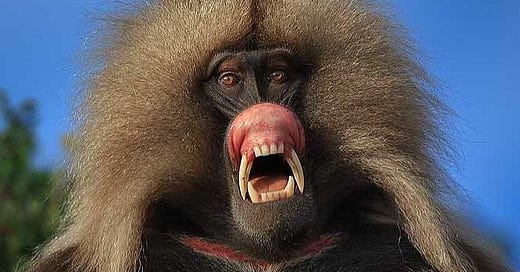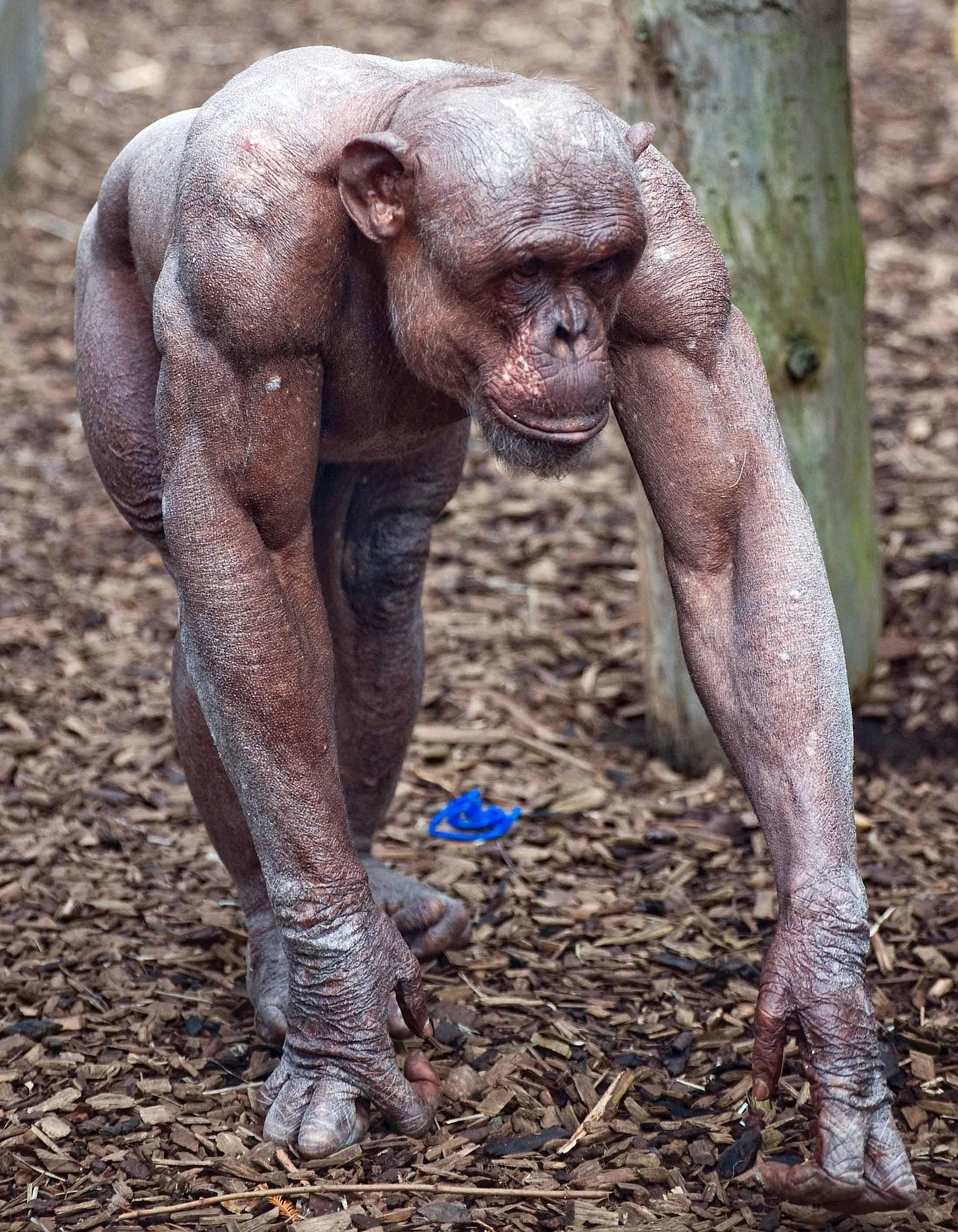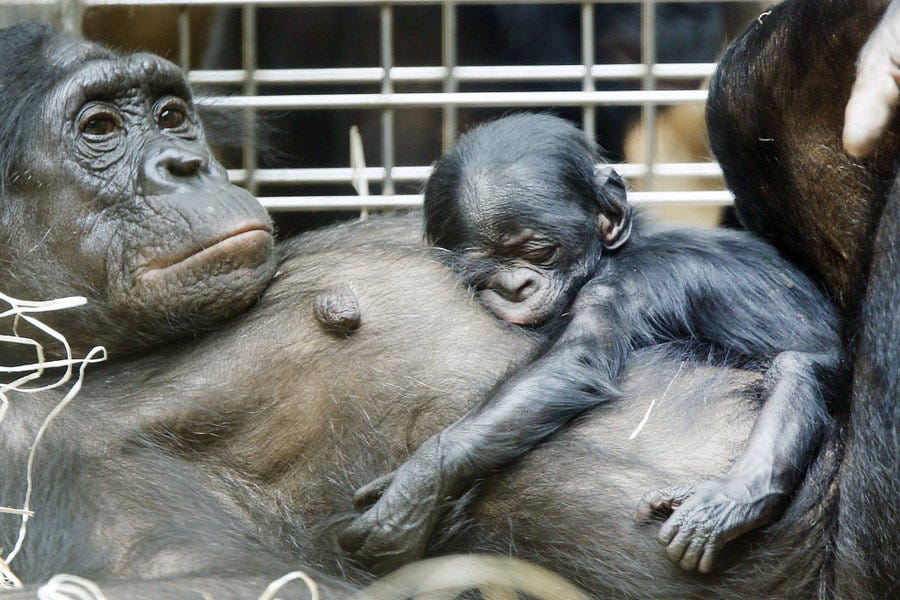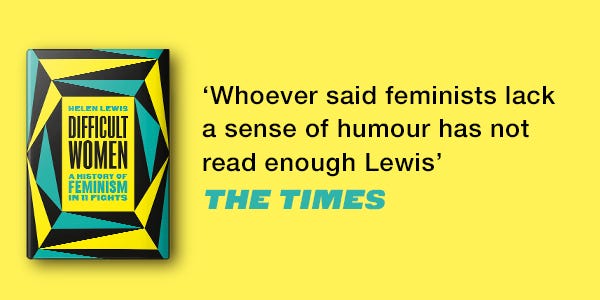Happy Friday!
Regular readers of The Bluestocking will know that I have a minor obsession with the Gombe Chimp War of the 1970s. Chimps! Had a war! A war so horrible that it shook Jane Goodall’s belief in the apes as essentially benign. (Unfortunately all the descriptions of the combat in Gombe are ruined by the fact that Goodall adopted a wildly eclectic naming practice, so “Hugh” and “Charlie” triumphed over “Humphrey” and. . . “Satan”.)
For a while, it was thought that Goodall’s own research had affected the chimps’ behaviour — she had set up a feeding station — but a new analysis in 2018 using her notes showed that the three highest-ranking males had drifted apart over several years, and the eventual war was sparked by a power struggle between them, which was made more acute by a shortage of fertile females. “Humphrey was large and he was known to throw rocks, which was scary,” Anne Pusey, one of the original researchers, who carried out the new analysis, said when the results were released. “He was able to intimidate Charlie and Hugh separately, but when they were together he tended to keep out of the way.” Humphrey eventually saw off Hugh, Charlie and the other males from their clique, and violently kidnapped three of the tribe’s females. According to Goodall, Satan drank the blood of one of the beaten tribe’s males, Sniff, as it welled up from a wound on his face. “For several years I struggled to come to terms with this new knowledge,” she wrote later. (For an insight into how terrifying chimps can be, here is footage of a tribe play-fighting in Twycross Zoo, including two males with alopecia, which shows exactly how jacked they are.)
I mention this because I’ve just finished reading Linda Scott’s The Double X Economy, a book about how women are excluded from the formal economy — and from economics departments. Scott’s great enemy is male dominance, which you can also call patriarchy. She doesn’t think it’s natural, and doesn’t buy the explanations of evolutionary psychologists that humans are destined to be as warlike, rape-enthusiastic and violent as chimps. She points out that we share a similar amount of our DNA with bonobos, which kiss each other, are more laidback, and settle their disputes by shagging, like actors do.
However, the culture of great apes does explain something I’ve wondered about for years: how do bastards rise to the top of so many organisations? According to Scott, male-dominated companies and institutions end up like chimp tribes: a handful of high-ranking men keep their places secure by bullying all the women out and cowing the other men into submission. The problem is therefore #notallmen, but the small percentage of “precarious men” who don’t want equality because their masculinity and status is threatened by anything they see as girly.
Male chimps practise rape, and infanticide, and females therefore offer themselves to all comers when they’re fertile, so that no male knows if the resulting offspring is his. But tragically, that’s an adaptive strategy rather a choice:
Occasionally, a male and a female will have a courtship in which they share food, groom each other, and then sneak into the forest when estrus comes. In controlled tests female chimps prefer this “nice guy” type, but that outcome is rare in the wild because aggressive males overpower the females and dominate the other males. . . chimp rapists are essentially forcing violence into the gene pool, as well as reinforcing it through their behaviour.
The Bastard Chimps are especially successful in areas marked by abundant food and little disease. One particularly violent group of “gangster chimps” in Uganda rampaged through their area, wiping out the small monkeys that provide them with animal protein by eating them all. It looks like “survival of the fittest”, but Scott argues that they have devastated the area’s natural resources. At some point, their freeloading will have wreaked such destruction on their habitat that their population could collapse. (Remind you of any other species?)
Scott also tells the story of a group of baboons studied by Robert Sapolsky since the 1970s. A baboon alpha male “does not find food, but waits for the females to do it, and when the group is attacked, he finds a safe place to hide and lets the other males do the fighting.” Males bully each other down the hierarchy, and all males bully the females. Being an alpha baboon, like being Donald Trump, is pretty easy. It’s a mystery why both are so furious.
Then something happened. “Meat was left in the garbage bin of a tourist lodge nearby, and the baboons discovered it,” writes Scott. “The top-ranking males ate it all, refusing to share it with the downscale males or any females. Suddenly, the alpha male and his stooges were dead; the meat had been infected with bovine tuberculosis.”
It’s too perfect! Someone turn this into a play. Freed from the Bastard Baboons, the remaining females — which were now in the majority — and the low-ranking males (which were less aggro) “devised a culture that was less abusive, more cooperative, more egalitarian, and healthier”.
I love this anecdote, because it perfectly captures the toxic nature of macho work environments, and the fact that everyone outside the ruling Bastard Baboons, female and male, absolutely hates them. And yet they remain in place because the bastards promote other bastards, and the culture selects for bastards. If you’re male, you could throw your lot in with the females . . . or you could follow the prevailing dynamic.
Scott compares this set-up with university economics departments, which were historically dominated by men with stay-at-home wives who had no interest in “women’s work”. You might also look at the White House, or big banks, or those male-dominated comedy panel shows from the 2000s. Women can’t prosper at all, and men can only prosper by becoming bastards, or keeping in with the bastards.
Deeply enjoyable, and a great Wikipedia page.


Food Fight (The Fence)
While [Giles] Coren is the bête noire for the new mob, few major critics have been spared. In July, The Guardian’s critic, Grace Dent, was criticised for referring to ‘shadowy, money-rinsing kiosks called things like The Rainbow Egg Bubble Waffle Shop’ in a piece about Chinatown. In August, [Fay] Maschler was accused of racism after beginning a review of a pasta restaurant, Tavolino, by comparing Italian food to Eritrean cuisine. The piece was briefly taken down before being reinstated with mild edits. Prior to Maschler’s article, [Eater blogger Jonathan] Nunn had written that ‘more pasta restaurants were reviewed in the uk this year than Indian, Pakistani, Bangladeshi, Chinese, Korean, Thai, Japanese East + West African and Caribbean restaurants combined’. In September, a Vice study found that only two out of 328 restaurants reviewed in the year to January 2020 were owned by black proprietors.
This piece on bloggers vs established restaurant critics is very funny, and this Giles Coren comment is admirably honest about the motivations of everyone involved: “I think I am more useful to them politically and thematically as a dehumanized reactionary bogeyman to be pilloried without real thought or reflection, because we all need an enemy. And the same is true reciprocally – they give me a huge amount of material.”
The Wing: Fall of the Palace of Pinks (Tortoise)
To be a “GirlBoss” is not like being any other kind of boss – that is, a man. You are both the executive and avatar of your company, its hustler and the animation of its brand. [Winnie CEO Sara] Mauskopf said a potential investor had told her he didn’t think she and her co-founder had the ability to build the same “branded cult-like following that some of these other female-led companies have built”. Mauskopf told him that wasn’t their plan: they were two former engineers who wanted to build an online marketplace; it wasn’t really about Instagram. The interaction revealed to her how the [Audrey] Gelmans of this world had been required to establish a model: don’t be just the leader of your company, but its beautiful advert. The image of these women is fetishised as they rise, and then weaponised against them as they fall.
A Sophie Elmhirst long read! Christmas really has come early. This exploration of the downfall of “feminist private members club” The Wing is as good as you’d expect.
Many of the victims of America’s most prolific serial killer have never been identified — because he preyed on “drug users, sex workers and runaways whose deaths either went unnoticed or stirred little outrage”. Sometimes, all police have to go on are the portraits that Samuel Little, now 80, has drawn of them. (Washington Post)
Quick Links
Katie Herzog on how “lesbian” fell out of fashion.
Love an unexplained monolith. (NYT) Update: the monolith has now been stolen.
“Ahead of the trial, Temur was served with a worldwide freezing order preventing him from transferring funds or selling any assets. He said the order limited his spending to £3,000 a week. ‘Now maybe for the average person that seems like a fucking crazy amount but in reality it’s different,’ he said in a telephone interview from Dubai.” (Guardian)
“‘When I was in Zagreb, the foreign desk sent me [Robert Fisk’s] piece from rural Croatia,’ said former Telegraph journalist Francis Harris. ‘I said that’s impossible. No one could do that journey in a day, and I’d seen him at breakfast and dinner.’” It’s a strange quirk that journalism is very poorly set up to catch deliberately dishonest fabrication. (The Critic)
We should be tough on intervals, and tough on the causes of intervals, i.e. plays being too long. (Guardian)
The poker scene in Casino Royale, broken down. (Polygon)
This BBC report on Burnley is absolutely horrifying. Dickensian levels of poverty and despair. Notable that both vicars featured ended up crying.
Interesting rebuttal to the “white women voted for Trump! Apologise!” meme that went round last month and in 2016. As Jonathan Chait points out, it’s super weird to ask white women who voted Democrat to atone for the fact that other, completely different white women voted Republican. My tuppenceworth is that you can only do this sort of scolding with women, who are (inexplicably to me) huge consumers of media which tells them that they are failing in all kinds of ways. (NY Mag)
Christmas is coming. That’s all I’m saying.









